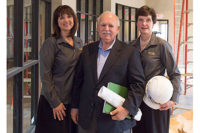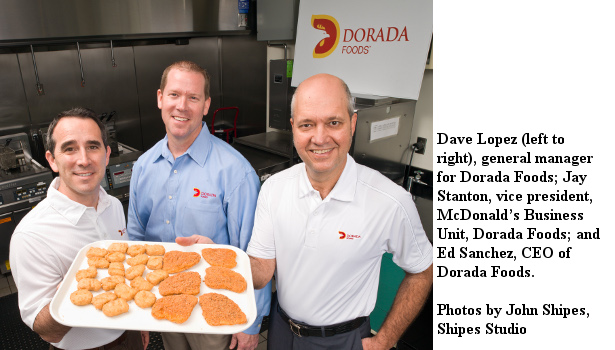Dorada Foods, a joint venture between Lopez Foods(headquartered in Oklahoma City, Okla.)and Tyson Foods(Springdale, Ark.), grew out of that very concept, when five years ago, QSR superstar McDonald’sCorp. (Oak Brook, Ill.)began soliciting bids to add a third supplier of its chicken nuggets, McChicken, Spicy McChicken and Southern Style Chicken filets.
Lopez Foods created DoradaFoods (Ponca City, Okla.)as a subsidiary, sharing management and accounting infrastructure in order to save costs and duplication, says Ed Sanchez, CEO of Dorada Foods and owner of Lopez Foods.
“We didn’t want to replicate all the G&A, so we incorporated right into the Lopez parent company,” he explains. “We had tremendous production experience and a great relationship with McDonald’s, but we needed the chicken expertise, and that’s where Tyson Foods came in. It’s unique — you don’t see [this kind of joint venture] much out there, and it is working out above and beyond our expectations.”
Finding a home
Once Dorada Foods won the McDonald’s business, the puzzle pieces began to fall into place quickly, with the combined power and knowledge base of Lopez and Tyson spurring things along. Tyson’s involvement as a minority partner has been integral to Dorada’s successful startup, says Jay Stanton, vice president, McDonald’s Business Unit, Dorada Foods.
First, an agreement was reached between the companies to remodel a 180,000-square-foot, former Tyson deli/slicing plant in Ponca City, Okla., to house Dorada’s production. That renovation project was completed in nine months (with the new facility dedicated Oct. 31, 2011), to the tune of $30 million, Stanton says.
Although the facility was 15 years old and in good physical shape, it needed major structural modifications to handle all the grinding, forming, cooking and freezing equipment and employees to producethe McDonald’s products. Stanton specifically mentions Gleeson, the construction company hired to perform the work, exceeded expectations throughout the project, keeping the renovationson schedule.
“We basically took the shell of the building,” Stanton explains. “We cut all the steel out, up to the bar joists, down to the mud slab — but it already had refrigeration, electrical and main switches. It had a lot of the big upfront costs in place and in good shape, so it was a very nice fit for us.”
Dorada’s next success came in the form of staffing the facility, Stanton explains. DespiteDorada being a “startup facility,” it searched for top-notch chicken-processing qualified staff, and today its workforce boasts an average experience level of 26 years in the chicken industry. This factor helped the company ramp up production once it met the quality standards McDonald’s requires of its suppliers.
“We hired some of the best out there,” Stanton explains, “but the training we acquired in the sister facilities was invaluable — if we’d have tried it ourselves, it probably would have taken longer because of the learning curve.”
Building business; selling safety and quality
In four to five months, Dorada Foods reached its current production level of 70 million pounds annually, which Stanton says is near capacity for its two production lines. At presstime, Dorada still had nearly 70,000 square feet of floor space unused in the facility, and Sanchez expects the company to add at least one new nugget production line to the mix this year. However, that is simply a hint at the growth he projects for the company over the next three years.
“We’ll probably have north of 500 employees here, as our plans come to fruition,” Sanchez says. “There’s a lot of activity in the marketplace right now in the protein business, and as regulations get tougher, as credit gets squeezed, you’ll have some smaller players falling out — we hope to pick up some of that business.”
Further down the road, Dorada could increase its footprint another 150,000 square feet without having to do major infrastructure buildouts on the 48 acres the company owns, according to Stanton.
In terms of customer growth, Dorada will follow a model similar to that of Lopez, in which McDonald’s anchors the customer base, but Dorada supplements that with other retail and foodservice co-packing and private-label business. Sanchez says Dorada can branch into beef and pork production seamlessly and readily if necessary, because the facility’s separation between former raw and fully-cooked production areas was maintained in the renovation.
Another concept Dorada expects to adopt from Lopez revolves around its commitment to food safety and quality, driven by its commitment to its customers. The Ponca City facility demonstrates that commitment, with a bevy of customized, state-of-the-art pieces of equipment designed to meet customers’ high standards of quality and safety.
“The equipment in place here is the most modern equipment available from a food-safety and a quality standpoint anywhere,” Sanchez says. “Other facilities may have it now, but we were the first plant in the United States to have the Marel X-ray machine, and it has produced the results we were targeting to reduce bone in the product.”
According to Stanton, the high level of technology the plant uses allows employees to make adjustments in response to real-time data from the equipment on the floor. (See sidebar, “Real-time engagement” below)
“As Ed explained, from our X-rays to our metal detection and our foreign-material abatement, we do a phenomenal job because of our state-of-the-art equipment,” he adds. “That’s the way we set it up, and that’s something we can offer any and all customers looking to partner with us.”
Following these proven models, as tested successfully and fine-tuned by its parent companies, Dorada Foods has a strong foundation upon which to expand and diversify its business. With room to grow and the right set of circumstances, Dorada may find itself heeding the call of more customers as a volatile, uncertain economy keeps the industry on its toes and ultra-competitive.





















